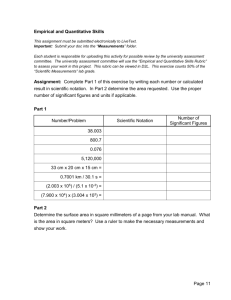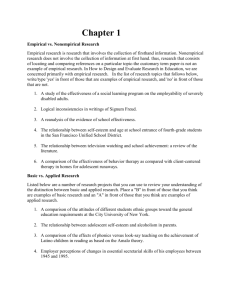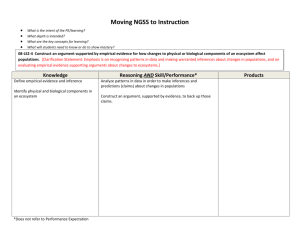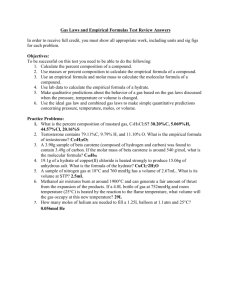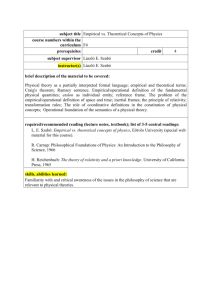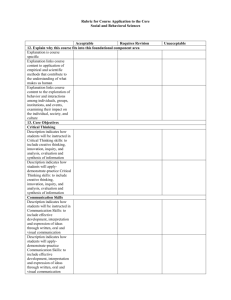Why do Research? Chapter 1 On What Basis Do You Make
advertisement
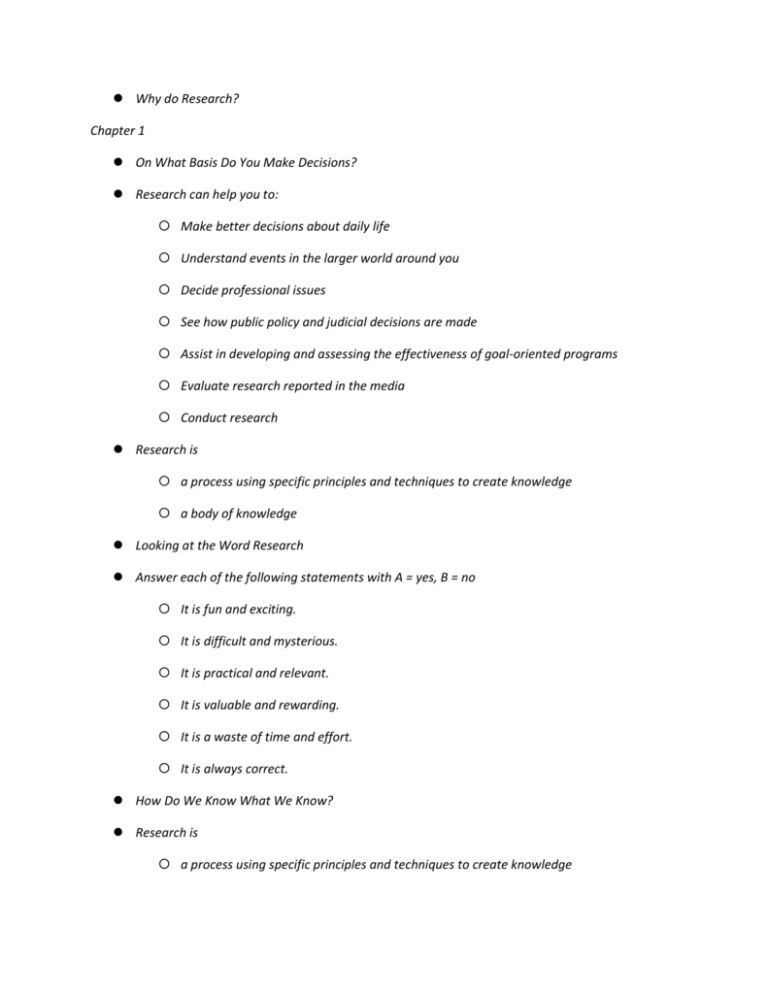
Why do Research? Chapter 1 On What Basis Do You Make Decisions? Research can help you to: Make better decisions about daily life Understand events in the larger world around you Decide professional issues See how public policy and judicial decisions are made Assist in developing and assessing the effectiveness of goal-oriented programs Evaluate research reported in the media Conduct research Research is a process using specific principles and techniques to create knowledge a body of knowledge Looking at the Word Research Answer each of the following statements with A = yes, B = no It is fun and exciting. It is difficult and mysterious. It is practical and relevant. It is valuable and rewarding. It is a waste of time and effort. It is always correct. How Do We Know What We Know? Research is a process using specific principles and techniques to create knowledge a body of knowledge Ways of Knowing Tenacity Intuition Authority Skepticism, science and the empirical approach How Do We Know What We Know? Ways of Knowing Without Research Prone to misjudgment, bias and distortion Media can distort research or social issues and make them confusing Understanding Research Research is an on-going process of search and working towards truth Research is a (slow) process that results in a product Research is not 100% foolproof. How Do We Know What We Know? Developing Critical Thinking Skills Critical thinking = a highly aware perspective that tries to avoid fallacies reveal assumptions adopt multiple viewpoints keep an open mind while questioning simple solutions How Do We Know What We Know? Developing Critical Thinking Skills Critical thinking uses a special type of argument called empirical evidence Argument = set of logically connected statements that start simple and end in a clear conclusion. Empirical evidence = evidence of actual events occurring in the world, that come from direct or indirect observations. How Do We Know What We Know? Characteristics of pseudoscience Hypotheses generated are not typically testable If scientific tests are reported, methodology is not scientific and validity of data is questionable Supportive evidence is anecdotal and does not cite scientific references Claims ignore conflicting evidence Claims tend to be vague, and appeal to pre-conceived ideas Claims are never revised Is it a duck? Does it quack http://quasar.as.utexas.edu/BillInfo/Quack.html How Do We Know What We Know? Characteristics of Pseudoscience (Lilienfeld, Lynn and Lohr, 2003) Overuse of ad hoc hypotheses to escape refutation Emphasis on confirmation rather than refutation Absence of self correction Reversed burden of proof Overreliance on testimonials and anecdotal evidence Use of obscurantist language Absence of connectivity with other disciplines What is Empirical Research? “Research” versus Empirical Research Research: Closely reading and studying specific documents Gathering preexisting information from academic journals or official government sources and making sense of it A process of applying accepted techniques and principles Applying critical thinking and adopting an orientation What is Empirical Research? “Research” versus Empirical Social Research Empirical Social Research: All of the above, plus Results stated in terms of probabilities or likelihoods Evidence based Constantly changing What is Empirical Research? What is Evidence? Quantitative Data = evidence in the form of numbers. Qualitative Data = evidence in the form of visual images, words or sounds. What is Empirical Research? Research is a Process that Results in a Product The product is knowledge or information. Research results are answers to questions. Good research raises new questions. What is Empirical Research? Varieties of Research Quantitative data collection techniques: Evidence in the form of numbers Experiments Surveys Content analysis Existing statistical sources What is Empirical Research? Varieties of Social Research Qualitative data collection techniques: Evidence in the form of visual images, words or sounds Ethnographic Field Research Historical-Comparative Research Fit the Question You Want to Answer With a Type of Research Exploratory Research = research into a new topic to develop a general understanding and refining ideas for future research Descriptive Research = research that presents a quantitative or qualitative picture of an event, activity or group Fit the Question You Want to Answer With a Type of Research Explanatory Research = research that attempts to test theory or develop a new accounting of why activities, events or relations occur as they do Evaluation Research = applied research that is designed to learn whether a program, product or policy does what it claims to do Fit the Question You Want to Answer With a Type of Research How to Use Research Basic Research = research to extend basic understanding and fundamental knowledge about the world by creating and testing theories Applied Research = research to answer a specific practical question and give usable answers in the short term How to Use Research Comparing Basic and Applied Research Neither is considered superior to the other Applied research is often guided by theories and findings of basic research Findings in applied settings often require modification of existing theories and spur more basic research Basic research is crucial to public policy Steps in the Research Process
